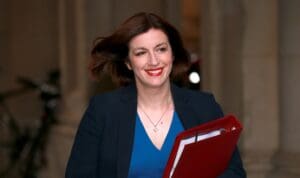
‘If they close, they close’: Education Secretary brushes off private schools’ fate while praising Trump’s war plan

The Education Secretary, Bridget Phillipson, has reiterated the Government’s stance on levying VAT on private school fees, insisting that closures in the sector are not a new development.
Appearing on Camilla Tominey Today on GB News, Ms Phillipson acknowledged that parents now face a choice in terms of fee-paying education, but stated she has no intention of reversing the policy.
“I don’t want disruption to children’s education if that were to result,” Ms Phillipson said. “But private schools, as businesses, will face choices as to how they manage their money. Parents also have choices as to how they spend theirs. If they choose not to opt for a particular school, and demand falls, that is how the market operates.”
When pressed on whether she was comfortable seeing further private school closures under her watch, Ms Phillipson noted that a falling birth rate has already led to “significant numbers of spare places” both in the state and private sectors. Highlighting that many private schools have shut down over the years, she stressed it is “not a new phenomenon” and that the broader trend has long predated the VAT policy.
Defending the policy
The Government’s decision to impose VAT on private education has sparked debate and concern among some parents and school administrators, who fear rising fees could drive more establishments to close. However, Ms Phillipson appeared resolute in her approach:
“Private schools, as I say, have closed in significant numbers for many, many years—this is not a new phenomenon. The policy stands, and I see no reason to move away from it.”
Welcoming Trump’s stance on Ukraine
Shifting focus from education, Ms Phillipson also used her appearance on GB News to address international affairs, specifically the ongoing conflict in Ukraine. In a move that may surprise some observers, she expressed support for recent calls by former US President Donald Trump to negotiate a peaceful resolution:
“We believe the British government should step up and play a bigger role,” Ms Phillipson told presenter Camilla Tominey. “That’s why we do welcome the approach of President Trump in bringing parties to the negotiating table and in seeking to secure an enduring and lasting settlement for Ukraine.”
Ms Phillipson linked the conflict to rising costs and economic instability at home, underlining the Government’s commitment to increasing defence spending. She noted that billions of pounds are being pledged annually to support the Ukrainian effort, describing the conflict as one with “big consequences here in terms of energy bills [and] the instability that is being caused.”
Acknowledging that the Defence budget had already risen under the Chancellor’s recent package, Ms Phillipson suggested there is scope to accelerate existing timelines for further spending:
“It’s been talked about getting [Defence spending] to 2.5% of GDP by 2028, not 2030,” she said. “Alongside that, we are committed to reaching 2.5% and we’ll be setting out a pathway towards it.”
While the VAT on private school fees remains contentious, Ms Phillipson appears unconvinced by arguments that it will lead to an unprecedented wave of closures. Pointing instead to broader demographic shifts, she reiterated the Government’s stance that private schools must adapt to market forces—a position that is likely to keep debate lively in the coming months.
Meanwhile, her supportive remarks regarding Trump’s diplomatic suggestions signal a willingness to endorse a wide range of interventions in the Ukraine crisis, placing further scrutiny on how the UK can expedite the conflict’s resolution. As both education and foreign policy challenges continue to evolve, Ms Phillipson’s firm positions on these issues will undoubtedly remain in the spotlight.
